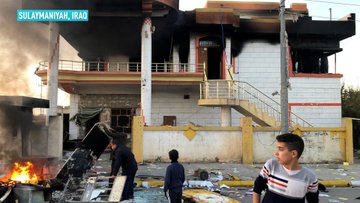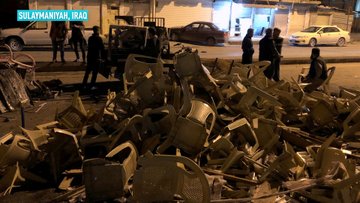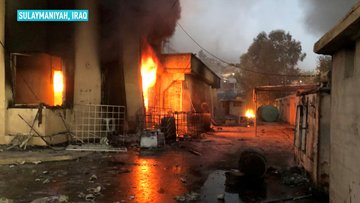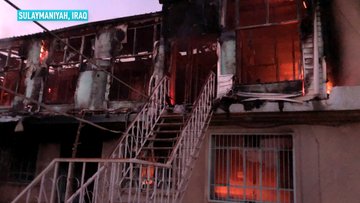Starting with Jimmy Dore.
Truth to power, Jimmy Dore. Now let me note this from Glenn Greenwald's latest:
Leading up to the 2020 election, much of the U.S. media and Silicon Valley giants decided that ensuring Trump’s defeat was such an overarching goal, a moral imperative, that anything and everything was justified to achieve it — including uniting with the professional liars of the CIA to disseminate blatant falsehoods about the Hunter Biden materials in order to discredit them, lead the public to believe they should be ignored, and justify their own burying and censoring of these materials.
There were some noble exceptions, such as a Washington Post news story from October 24 which — despite its inflammatory headline: “Biden relies on pattern of activity to blame Russia for release of data from what is said to be his son’s laptop” — warned that “the former intelligence and defense officials who penned the letter explicitly said they had no evidence of Russian involvement” and “the Biden campaign’s decision to lean into accusations of Russian involvement in the episode, despite lacking specific proof, risks eroding public trust in U.S. allegations of foreign election interference if the suspicions in this case turn out to be unfounded.”
But most outlets which cited the letter from CIA and other intelligence officials simply omitted that no-evidence admission altogether, or buried it so deep in their stories and broadcasts that all the public heard was that these completely authentic and obviously relevant documents could and should be safely ignored as “Russian disinformation.”
That’s the choice these media outlets made. They got the election outcome they wanted. But they and their reputations and legacy will have to live with this choice.
Amen. And my shorter version? Whores gotta' whore. And the corporate media sure as hell did.
Idiots of the week? The fools that slammed Glenn Greenwald. They were wrong. He was right.
Here's C.I.'s "Iraq snapshot:"
Friday, Decemeber 11, 2020. Protests continue in Iraq while the Pope notes the continued violence and the refugees.
Starting with Pope Francis.
He says of Iraq and Syria in the video above:
My thoughts go notably to the people who had to leave their homes to escape the horrors of war, in search of a better life. We must work to ensure that the Christian presence in these lands continues to be what it has always been: a sign of peace, progress, development, and reconciliation between peoples
Here's a video segment from ROME REPORTS on the Pope's remarks.
Carol Glatz (CNS via THE TABLET) explains:
Pope Francis encouraged every effort, big or small, to foster peace amid the crises unfolding in Iraq and Syria, and to help Christians remain.
Highlighting the desire of refugees to return to their homes, the Pope appealed to the international community “to make every effort to encourage this return, guaranteeing the security conditions and the economic conditions necessary for this to happen”.
Ines San Martin (CRUX NEWS) adds:
Close to 50 people, between Vatican officials and representatives of local Catholic Churches took part in the Dec. 10 virtual summit organized by the Vatican’s Dicastery for Promoting Integral Human Development. Though the Zoom dialogue focused mostly on Syria and Iraq, the cases of neighboring Lebanon, Turkey and Jordan – all hosting hundreds of thousands of refugees – were also considered.
Pope Francis has announced his plan to visit Iraq in March of the new year (March 5th to March 8th, see Wednesday's snapshot). If the visit takes place, it will be the first time a pope has visited Iraq. VATICAN NEWS notes:
Even though details of the visit have not been decided, the bishop said that Pope Francis wishes to go “to Mosul, a stronghold of the Islamic State for a long time, where the worst crimes of jihadist madness were committed.” “The Pope wants to go to Mosul and pray for the victims of the Islamic State” and the violence that took place in the city.
Catholics, Bishop Yaldo said, are “a small flock, but of great relevance.” “This Christmas will be special as we wait for the visit.” In the meantime, “we must do our best to ensure that it has the historical, cultural and religious importance it deserves.” “This visit,” he said, “will give an enormous boost to the country’s future and will guarantee great visibility to Christians. The Pope will give great significance and relevance to their presence and their suffering.”
According to the bishop, the stop at Ur of the Chaldeans, regarded as the birthplace of Abraham, will be the high point of the visit because Christians, Muslims and Jews regard him as a prophet. Abraham “represents the sign of unity for all of us who inhabit this land, for us who are in Iraq”. “Seeing Abraham’s house will be a great symbol of unity for all religions that have this element in common,” Bishop Yaldo said.
Like the rest of the world, Iraq is experiencing the pandemic. XINHUA notes, "The Iraqi Health Ministry reported on Thursday 1,380 new COVID-19 cases, bringing the total nationwide infections to 571,253, while the recoveries surpassed 500,000." In the face of the pandemic, Kevin Clarke (AMERIA: THE JESUIT REVIEW) wonders about the safety of the announced visit:
While a visit from the pope will no doubt provide a spiritual and psychological boost to Nineveh Christians, under the current pandemic conditions it is a prospect that must give local public health officials pause. “The people will go to see him even if there is coronavirus,” Mr. Towaya assures. “They don’t care about that; they will not stay home; they will go, and they will receive him.”
World Health Organization officials and the Holy See Press Office did not respond to questions about how the pope’s visit and related public events could be conducted safely, but W.H.O. guidelines currently in effect urge “that all countries with community transmission should seriously consider postponing or reducing mass gatherings that bring people together and have the potential to amplify disease.”
Though rates of Covid-19 in Iraq have declined since October, on average more than 2,000 new cases have been confirmed each day throughout November and December. More than 571,000 Covid-19 cases have been reported in Iraq since February, and more than 12,500 Iraqis have died.
Even as announcements are made of vaccine breakthroughs and wealthier nations like the United States and United Kingdom line up to reserve millions of vaccine doses, the World Health Organization predicts widespread distribution of a vaccine for coronavirus will not begin until sometime in the middle of 2021, long after the dates currently proposed for the pope’s visit to Iraq. A W.H.O. program to accelerate development and distribution of an affordable coronavirus vaccine faced a $28 billion shortfall in December.
A visit by the Pope would provide many benefits -- including uplift and excitement -- at a time when many Iraqis suffer -- continue to suffer -- in the ongoing war.
Let's again note this video about abuse in Iraq.
We'll again note The Wilson Center's Hanaa Edwar:
This year, we have launched the mapping report on Sexual and GBV in Iraq 2003-2018, which was developed by Iraqi Al-Amal Association, Impunity Watch and PAX. The report is part of a broader project entitled “Engendering the Transition to Peace and Security in Iraq” funded by the Dutch Ministry of Foreign Affairs.
In addition, since the outbreak of protest demonstrations on October 2019, we have documented the killing of six female demonstrators and activists in different provinces. The latest was Dr. Reham Jacob in Basra in August 2020. Plus, many demonstrators encountered assassination attempts, death threats, abduction, or sexual assault. Many activists went into hiding to keep themselves and their loved ones safe.
Due to the influence of militias in the political and security apparatus and the spread of corruption in Iraq, women’s rights defenders, activists and journalists lack basic legal and social protections. We are seriously concerned about the impunity of death threats, abductions, sexual assault, intimidation, online harassment, and smear campaigns against them. We call on the international community to exert pressure on the Iraqi government to adhere to justice, accountability, and transparency through effective investigations of these crimes. Without protections for activists and civil society leaders, Iraq will never move forward on ending GBV.
Iraq is a war zone. It remains one. The US-led invasion of 2003 set off an ongoing war and just because the US press largely withdrew at the end of 2008 doesn't mean that the war ended. The violence continues. UNICEF notes:
In Sinjar, two children were killed and another two injured when unexploded ordnance went off. This is a stark reminder that landmines and explosive remnants of war continue to threaten the lives of children in Iraq. In Sulaymaniyah, at least one child was killed during the ongoing wave of protests in the governorate.UNICEF strongly urges all parties to protect children and keep them out of harm's way. Children should be safe everywhere, in their homes, in neighborhoods, and on the streets. This continued violence and disregard for children's safety should stop. Children's right to live in safety, protected from all forms of violence, is a right that is enshrined in the United Nations Convention for the Rights of the Child. Iraq is a signatory of the Convention and must therefore do all that it can to ensure that every boy and girl can live in safety and dignity.
School in the midst of a pandemic? Not easy even outside a war zone. In Iraq? One Nation is working to provide education centers.
In the US, idiots puffed out their chests for wearing pink hats and marching (for nothing, by the way) in DC to protest Donald Trump's election as president in 2016. It was a waste of time. It's the Sam Seder of 'politics.' It's meaningless. It's a statement where none is needed. Sam Sader doesn't do issues. He does partisan talking points. The late Kevin Zeese spend his life fighting for issue -- Medicare For All, an end to war, etc. These are real issues and these are issues to go into the streets. Corruption, violence against the people, a living wage, etc. Putting on a pink hat and stomping around DC because you don't like an election outcome is, at best, really bad performance art/street theater. It's not risking anything in terms of personal safety and it's not demanding anything.
It's nonsense. Get out in the streets to protest police violence, to demand a living wage, to scream that Congress gets off its ass and starts working for the people, real issues. "My itty bitty feelings are hurt that my favorite person didn't win the election!" That's cry baby nonsense.
Well off or well funded cry baby nonsense, we should note. Most Americans don't have the luxury of being able to travel to DC to stomp their feet over an election -- either they lack the funds or they have demands -- jobs, children, caregive for family members -- that don't allow them to just up and travel.
Real protests matter. And real protests are taking place in Iraq.
Protests have been taking place in Iraq for over a year now. You don't see our US 'left' outlets noting those protests. But those protests take place. And the Iraqi people risk their lives protesting. Bullets are used on them, tear gas, sonic bombs. They are bullied at protests by the security forces, they are often stalked on their way homes from a protest. Many of the protesters have been disappeared -- an issue that Amnesty International is supposedly watching (according to a friend with Amnesty UK). They are risking everything to make demands. For? Jobs. An end to corruption. Basic services like electricity and potable water. A government that works for the people.
They are making real demands.
Nasiriyah has been carrying out protests for some time now. At the end of last month, cult leader Moqtada al-Sadr turned his goons loose on the peaceful protesters. Some were wounded (around 80) and some were killed (6 to 18 depending on the outlet). Still they protest.
We'll note this Tweet as well:
Another hot spot for protests in the last few weeks is Sulaymaniyah.
This morning, Hoshang Waziri Tweets:
Ibrahim al-Zobeidi (ARAB WEEKLY) offers this view:
What happened and is happening in Sulaymaniyah is no different from what happened and is happening every day in Baghdad, Nasiriyah, Basra and other Iraqi cities. Same reasons, same motives, and same results.
Yes, it is the same anger that is driving the masses to take revenge on the ruling parties, and the same cruelty that is used to suppress the demonstrators with batons, gas bombs and, finally real bullets, if they are not deterred at the first sign and return to their homes obediently, so that they do not, after today, dare attack their masters.
What is evidenced by the details of the Sulaymaniyah battles between the oppressed and robbed Kurdish citizens and their oppressors and exposed robbers, is that all that talk by Kurdish political leaders, from complaining about being oppressed for a long time to calling for protecting the citizen’s dignity, guaranteeing his security and independence, and restoring his legitimate rights to justice, equality, job opportunities and prosperity, was nothing but a smokescreen.
And they were no different in this from their Islamist allies who have monopolised power, money and weapons in the Arab half of Iraq; they are all made of the same clay and in the same mould.
The following sites updated:








